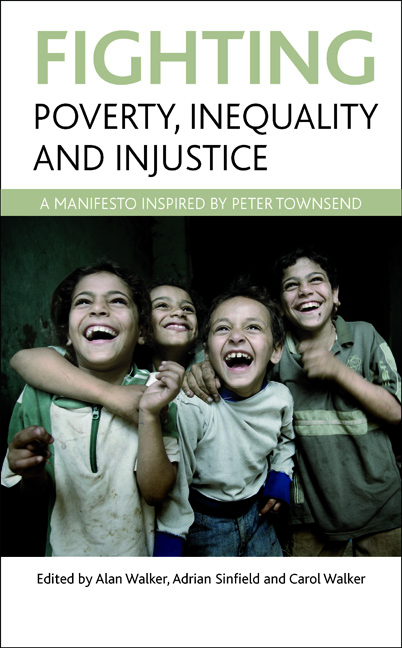Book contents
- Frontmatter
- Dedication
- Contents
- List of figures and tables
- Preface
- Notes on contributors
- one The legacy of Peter Townsend
- two The making of a pioneer researcher: reflections from Peter Townsend’s life story
- three Peter Townsend, a man ahead of his time: re-reading The family life of old people and The last refuge
- four The case for universal child benefit
- five Poverty
- six Social justice for children: investigating and eradicating child poverty
- seven For universalism and against the means test
- eight Underclass, overclass, ruling class, supernova class
- nine Addressing health inequalities: building on Peter Townsend’s legacy
- ten Towards a new sociology of ageing: from structured dependency to critical gerontology
- eleven Disability: prospects for social inclusion
- twelve Putting the lawyers in their place: the role of human rights in the struggle against poverty
- thirteen Radicalising social policy in the 21st century: a global approach
- fourteen Conclusion: building on the legacy of Peter Townsend
- Index
two - The making of a pioneer researcher: reflections from Peter Townsend’s life story
Published online by Cambridge University Press: 01 September 2022
- Frontmatter
- Dedication
- Contents
- List of figures and tables
- Preface
- Notes on contributors
- one The legacy of Peter Townsend
- two The making of a pioneer researcher: reflections from Peter Townsend’s life story
- three Peter Townsend, a man ahead of his time: re-reading The family life of old people and The last refuge
- four The case for universal child benefit
- five Poverty
- six Social justice for children: investigating and eradicating child poverty
- seven For universalism and against the means test
- eight Underclass, overclass, ruling class, supernova class
- nine Addressing health inequalities: building on Peter Townsend’s legacy
- ten Towards a new sociology of ageing: from structured dependency to critical gerontology
- eleven Disability: prospects for social inclusion
- twelve Putting the lawyers in their place: the role of human rights in the struggle against poverty
- thirteen Radicalising social policy in the 21st century: a global approach
- fourteen Conclusion: building on the legacy of Peter Townsend
- Index
Summary
Peter Townsend was in no doubt as to how much of his development as a major researcher he owed to his direct personal social experience. ‘Nowadays, I reflect a lot on the question of being an only child and what that means. It led, in part, to my enormous interest in family relations and extended family life, and the structure of families’ (p 5), he remarked early in the first session of the life story interview which I recorded with him. It seems too that he grew up with a family tradition of telling stories about the personal past. He said of his mother, ‘You can tell she has been an enormous influence on me, because she has a huge sense of narrative and wit, and regales every audience with most extraordinarily pointed and revealing stories about past experience’ (p 4).
With this life story interview, Peter's reflection on his own past was so thorough that we needed five long sessions to complete it, with altogether 17 hours recorded. For each session he prepared thoughts on new themes, and throughout he continued to speak with such unusual coherence that it only needed careful punctuation to turn his oral discourse into a publishable form. This means that in this discussion I will be able, to an unusual extent, cite directly from the interview and so to give Peter's account of his development in his own voice.
Childhood roots: the extended family
Peter saw three fundamental influences as running through his childhood and early adulthood. The first, and the most precise, was the experience – at a time when divorce was very rare – of being ‘the only child of a lone parent family’ (p 2). Interestingly, he did not see being an only child as in itself a disadvantage: on the contrary, ‘that isolation … the intensity of depending on your own resources, which I had to experience as an only child … I think those were very productively creative things, as far as I was concerned’ (p 9). Still more significant, however, was the consequence of his parents’ break-up for the family structure.
- Type
- Chapter
- Information
- Fighting Poverty, Inequality and InjusticeA Manifesto Inspired by Peter Townsend, pp. 29 - 58Publisher: Bristol University PressPrint publication year: 2011



